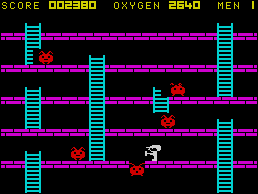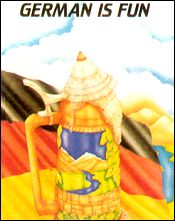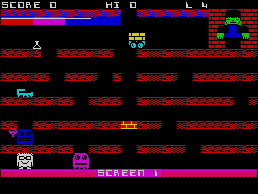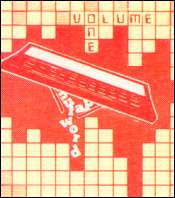| Spectrum Software Scene |

THE MINER or explorer being chased through subterranean caverns by monsters of many kinds is now a common motif in computer entertainment and it would take a vastly superior program to oust Manic Miner from its place at the top of the pile. Sam Spade from Silversoft, which will run on any Spectrum, is yet another version on the theme and is no real contender against Miner Willy. Sam, our hero, is a miner digging kryptonite in the usual multi-layered cave. The precious ore is guarded by small, fast-moving monsters of red, green and yellow varieties. Sam is moved up and down the cavern using the keyboard or a Kempston joystick and climbs ladders to move from one level to the next.
To survive and to score he must dig holes with his hammer through which the monsters will fall, provided they are helped by a few taps on the head as well. Red monsters will die by falling only one level but to kill the others the player must dig sets of holes, as the green and yellow baddies must drop two and three levels respectively to be destroyed.
That takes some doing - the monsters are fast and voracious and it is all too easy to paint Sam into a corner. There is the added difficulty of a decreasing air supply.
While the program ran smoothly, the format became rather repetitive after a time, even though one's ingenuity is taxed by putting the proper holes in the correct places. The game is no match for the ever-moving, ever-changing caverns through which Willy has to struggle and leaves Sam, as an average kind of miner, undistinguished by comparison.
| SAM SPADE | Memory: Any Spectrum | Price: £5.95 | Joystick: Kempston | Gilbert Factor: 5 |
MIND GAME enthusiasts should find Arcturus from Visions Software Factory just the thing to occupy a few spare hours - or days. At the start of the tape are about 20 screens recounting the saga of how the Arcturans' ultimate mental challenge formed part of a plot to take over the free world and, although there seems to be no harm in it, it is not clear why it was included, since it has no bearing on the game. So, unless you have nothing better to do, skip the saga and start with the demonstration of the game, which could be described as a complex form of noughts and crosses.
Each player attempts to place noughts or crosses in a line of four on either one single squared board or across the four which are shown in perspective, superimposed one above the other on the screen. What constitutes a line, difficult to grasp at first, becomes clear after a few bouts against the computer, which can operate on 10 levels of skill.
Apart from that, the game incorporates a number of other choices and refinements. You can play against another player instead of the computer, with or without sound effects, and with the clock switched on or off. You can also replay a game, load and save one, or consult the computer for help.
The screen display is clear and the method of making moves is simple and convenient; you use the cursor keys to move round the squares and press ENTER for the square you want. For those who like to pit their wits against a computer rather than human opponents, it is a well-presented version of an unusual and interesting game.
| ARCTURUS | Memory: 48K | Price: £6.95 | Gilbert Factor: 7 |

USING combination of graphic displays and word drills, German Is Fun presents German vocabulary and phrases for beginners in a way reminiscent of a standard idiomatic phrase book. The program is divided into nine main topic sections which deal with the areas most likely to be of use to the holidaymaker or basic student.
The main menu provides a simple selection procedure for each topic. When a selection is made a set of options is offered which will allow the student to choose the picture only, the picture with test, phrases only or picture with phrases. The first option sets up a picture, item by item, showing the corresponding English and German words, while the second will test you on those words.
The program is very user-friendly, allowing exit from any section at will and, in the word-test section, providing the next letter in response to a question mark. The graphics are cheerful and well-drawn with some movement at certain points. It is a meticulously-devised program and, for anyone who has a basic grasp of German pronunciation will be extremely useful as a supplement to oral experience.
| GERMAN IS FUN | Memory: 48K | Price: £5.95 | Gilbert Factor: 8 |

IT IS FORTUNATE the reviewer of Dr Franky and the Monster already had his own copy of the program. The game provided for review loaded perfectly, displaying the initial Manic Miner-style cavern, a few ghosts, the flask of elixir and the famous monster waiting for life to be poured into him. There it stopped, as the motion keys failed almost completely to obtain response on-screen. Irritation replaced interest after a dozen or so attempts to play.
There appeared to be no data corruption, however, and the second copy functioned perfectly. Whether it was one bad tape or a potential bug is yet to be seen so, if you buy the game and have similar problems, refer it to Virgin Games.
The aim is to bring the bolt-necked monster to life by collecting a flask of chemicals which must then be given to the lifeless hulk at the top of the tiered caverns, nine in all. The gloomy dungeons are also populated by the ghosts of the wretches whose spare parts have been used to manufacture the monster. They will hunt you as you attempt to move and jump along the passageways. There are other hazards such as mine wagons and bridges to negotiate. Movement is simple using only three keys.
The graphics are bright, fast and clear and you will need to move with some speed to avoid the vengeful ghosts. The monster comes to life with a satisfying electrical glow once the flask has been taken to him by the bizarre Dr Franky and good timing and judgement are needed to do that successfully. Dr Franky is an enjoyable and attractive game but, in view of the problems experienced by the reviewer, it may be wise to check that your copy runs well before you leave the shop. Dr Franky and the Monster will run in 48K only.
| DR FRANKY | Memory: 48K | Price: £5.95 | Gilbert Factor: 6 |
ESKIMO EDDIE from Ocean Software invites the player into the Arctic. Eddie must battle against Growler the polar bear in his attempts to rescue Percy the penguin. On the second screen the penguin must defend itself against deadly snowbugs by pushing ice-blocks into their paths.
That is rather a dramatic description of the action on-screen which gives the impression of a frosty Frogger. In the first part the player must steer Eddie up the screen by keys or a variety of joysticks. Two polar bear figures and three jagged icefloes march across and Eddie will be killed if he makes contact with them.
After a few tries the graphics display is not very gripping or colourful. The repetitive quality of the tasks will not appeal to those fond of complex games, though it is possible younger children will enjoy it for a time. All in all, a disappointing production from Ocean Software.
| ESKIMO EDDIE | Memory: 48K | Price: £5.90 | Joystick: Kempston, Sinclair, Protek | Gilbert Factor: 4 |
ROBOT RIOT from Silversoft centres on a revolt of the robots in which the only way to regain control of the building is to lay bombs over the entire floor area and thus force the King robot to escape from his central control room. That is not the end, however, as it will escape only to another floor, where you must start laying bombs again.
Anyone who has played Pac-man or any of its many derivatives will be familiar with this game, where the main difference from the original is that instead of eating dots you are laying a trail of them.
You lose a life whenever you run out of power but in yet another familiar touch the regular consumption of power mites will prevent the disaster.
One interesting feature is the way the game starts with an introduction to the various robots, with details of their speed, intelligence and destructive powers. Apart from that, Robot Riot can in no way claim originality but it manages to be absorbing and addictive, especially if you enjoy maze scenarios, and the robot graphics are lively.
Experienced players may find it slow and it is a pity that each time you lose a life you have to return to the start, instead of continuing from where you left off, making the game more frustrating than it need be.
| ROBOT RIOT | Memory: 48K | Price: £5.95 | Joystick: Kempston | Gilbert Factor: 6 |
READING the playing instructions to Reactor from Gemini might lead you to believe that you have to be a nuclear physicist to play, but in practice the game is not so complicated as it sounds.
The object is to control a nuclear reactor by moving a control unit in such a way that the metal elements bounce from it at right angles and hit the central discharge unit, a tricky manoeuvre until you get used to it. Each time you accomplish it successfully, the power of the reactor increases and radiation is kept under control.
There are neutrons to take into account; whenever they hit a piece of metal it splits into two, increasing radiation. Further, if you collide with metal after having absorbed neutrons, you lose one of your four lives.
Keeping power up and radiation down for the required time leads to the next stage of the exercise, which involves laying a trail of concrete to box-in every metal element in sight. You can then go on to try your hand at controlling a new and more difficult reactor, knowing that sooner or later nuclear power will inevitably get the better of you.
The graphics are relatively simple but the game offers a new and original concept and its degree of difficulty is well-judged to keep you playing for a long time.
| REACTOR | Memory: 48K | Price: £7.95 | Joystick: Kempston | Gilbert Factor: 7 |
THE CASSETTE cover of Strike Attack from Micromart for the 48K Spectrum claims that the program is the ultimate simulation, which might lead a potential buyer into thinking that the program has similarities to the Psion or Hewson programs which feature visual representations of cockpit views. The instructions enclosed are more explicit and tell you that you will be provided with all the information you would have obtained by instrumentation or by visual means.
In fact, the player is cast in the role of the navigator of a NATO Phantom attempting to destroy an enemy base with bombs and is provided with a set of readings indicating flight status. The situation outside the aircraft is represented solely by a grid in centre screen on which graphic symbols depict target, hostile fighters and the Phantom.
Using the keyboard, the player moves the aircraft across the grid, paying attention to the various instrument readings and hoping to avoid missiles and other attacking aircraft by breaking. That is meant to represent the tight turns necessary in air warfare to escape attack. Warnings are flashed on-screen to describe the type of attack. There is a training mode and an operational level.
The instruction manual is rather impenetrable but after a few practice runs you will appreciate the general idea if you are not deterred by witty comments like "You jerk, you didn't break hard enough". The program seems to run very slowly and the response time to commands is slow. That becomes a real disincentive to continuing after a time and there is little feel of controlling an aircraft - more the sense that you are obeying the computer orders.
Because of that the game is not compelling enough to make you want to get back in the air. Two or three attempts after the training sequence convinced the reviewer to seek pastures new. The program did not live up to the packaging.
| STRIKE ATTACK | Memory: 48K | Price: £6.95 | Gilbert Factor: 4 |

WORK FORCE appears to be attempting the impossible with its Computaword, with predictable results. It is difficult to think of any advantages a computerised crossword might have over the simple but much-loved printed variety and Computaword fails to demonstrate any. Not only would you have difficulty in taking it on the train but it presents all kinds of other obstacles, such as the time it takes for the grid to display, the difficulty of consulting clues, and the laboriousness of entering answers. All of those difficulties could be abolished by using paper and pen.
The program might have offered a crossword which was more intelligent than an ordinary one but that is not the case. Computaword accepts incorrect answers; if you ask it for help it fills-in the whole crossword rather than answering one clue; and, to top it all, it even plays Congratulations after it has supplied the correct solution for you.
There are 10 puzzles which adds to the variety but also to the total amount of loading time needed before you can play. The crosswords are straightforward but difficult to solve, so that the program would not even be suitable for introducing newcomers to crosswords.
| COMPUTAWORD | Memory: 48K | Price: £6.95 | Gilbert Factor: 2 |
ANYONE concerned about the fate of the Pi-man will be relieved to hear that after the alcoholic excesses of Pi-eyed, he is now utterly reformed, even to the extent of entering for five events in the Olympic Games.
That, however, is probably the best piece of news about the latest game from Automata, Olympimania. Apart from the usual excellent graphics - the most spectacular sequence is the Olympic stadium with its rostrum and wildly waving crowds - the game has a limited amount to offer in the way of entertainment. The five events - Pi-jump, Alpi skiing, Pitathlon and so on - are all similar, with a series of obstacles to jump and some unlikely hazards to overcome, such as rival competitors who dig holes beneath the Pi-man, or fish and alligators in the case of the swimming event.
In all the events, it is extremely difficult to win a bronze medal, let alone a gold, and as a result the interest soon palls in spite of the amusing graphics. The reverse side of the tape, true to Automata traditions, has a pop music track, described as a choral extravaganza of the Piland International Anthem. The kindest thing to be said about it is that by comparison it places its companion game in a favourable light.
| OLYMPIMANIA | Memory: 48K | Price: £6 | Gilbert Factor: 6 |